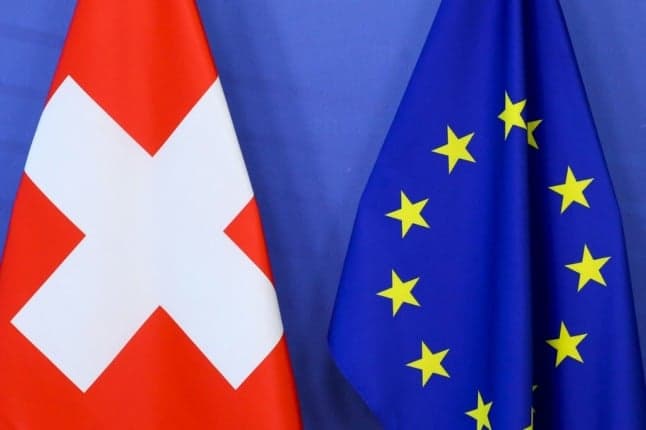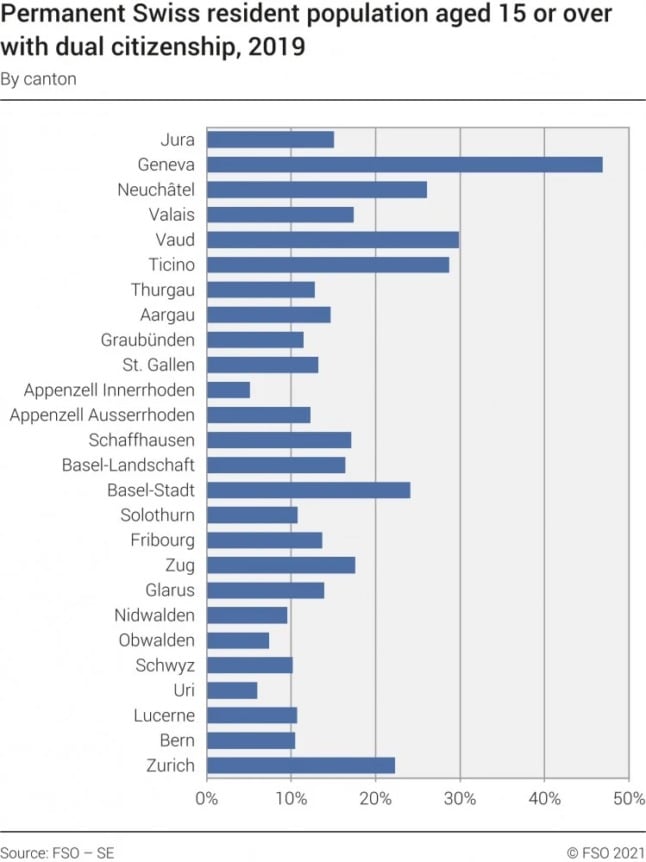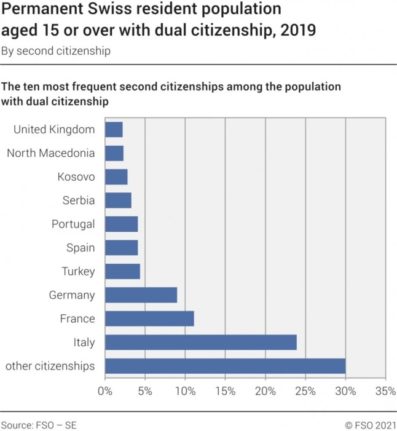What do we know about Geneva's dual citizens?

The most international of Switzerland’s cantons and cities — 46 percent of Geneva residents are dual citizens — people who obtain the Swiss passport while still maintaining the nationality of their place of origin.
With over 200 international organisations — including the United Nations agencies and numerous NGOs — located on its territory, it is understandable that about 40 percent of Geneva’s permanent population of just over 620,000 is foreign.
And 46 percent of the Swiss population aged 15 or over residing in Geneva has dual nationality, by far the highest rate in the country, according to both federal and cantonal statistics.
This chart from the Federal Statistical Office (FSO) shows that Geneva is far ahead of other cantons in the number of bi-nationals.

Why do so many people opt for two passports?
The most obvious benefit of dual citizenship is the ability to live and vote in both countries, without having to give up any rights in either.
These numbers pertain only to those living permanently in Geneva— that is, they don’t include the 90,000 cross-border commuters employed in the canton.
This is what we know about these bi-nationals
Not surprisingly, given Geneva’s proximity to France and its linguistic similarity, most bi-nationals living in the canton — 27 percent — are also French citizens, according to the Cantonal Statistics Office (OCSTAT).
They are followed by Italians (17 percent), and Spanish and Portuguese (both 9 percent).
Birth versus naturalisation
Being born in Switzerland doesn’t mean the person is automatically Swiss.
If their parents were born abroad and hold only foreign passports, a person will not obtain Swiss citizenship by birth.
Even though they have lived their entire lives in Switzerland, they have the same nationality as their parents and will continue to be considered as foreigners – until and unless they become naturalised.
In Geneva’s case, 63 percent of bi-nationals were naturalised, while 37 percent have had Swiss nationality from birth and obtained a second one later, according to OCSTAT.
READ MORE: Have your say: Tell us about getting citizenship in Switzerland
The French in Geneva stand out for their high proportion of dual nationals by birth (60 percent). For Italians and Spanish, the shares of dual nationals by birth are 38 percent and 34 percent, respectively.
The Portuguese were the last to immigrate to the canton, so the number of dual nationals by birth in this community is only 10 percent. The same is true for other countries of recent immigration.
How does Geneva compare with the rest of Switzerland?
As the chart above shows, at 46 percent, Geneva has the largest proportion of dual nationals.
Vaud is next (30 percent), followed by Ticino (28 percent), Basel-City (25 percent) and Zurich (23 percent).
Nationwide, Italians make up the bulk of dual nationals (23 percent), ahead of the French (12 percent), and Germans (8 percent).

READ MORE: Naturalisation through marriage: How your partner can obtain Swiss citizenship
Comments
See Also
With over 200 international organisations — including the United Nations agencies and numerous NGOs — located on its territory, it is understandable that about 40 percent of Geneva’s permanent population of just over 620,000 is foreign.
And 46 percent of the Swiss population aged 15 or over residing in Geneva has dual nationality, by far the highest rate in the country, according to both federal and cantonal statistics.
This chart from the Federal Statistical Office (FSO) shows that Geneva is far ahead of other cantons in the number of bi-nationals.

Why do so many people opt for two passports?
The most obvious benefit of dual citizenship is the ability to live and vote in both countries, without having to give up any rights in either.
These numbers pertain only to those living permanently in Geneva— that is, they don’t include the 90,000 cross-border commuters employed in the canton.
This is what we know about these bi-nationals
Not surprisingly, given Geneva’s proximity to France and its linguistic similarity, most bi-nationals living in the canton — 27 percent — are also French citizens, according to the Cantonal Statistics Office (OCSTAT).
They are followed by Italians (17 percent), and Spanish and Portuguese (both 9 percent).
Birth versus naturalisation
Being born in Switzerland doesn’t mean the person is automatically Swiss.
If their parents were born abroad and hold only foreign passports, a person will not obtain Swiss citizenship by birth.
Even though they have lived their entire lives in Switzerland, they have the same nationality as their parents and will continue to be considered as foreigners – until and unless they become naturalised.
In Geneva’s case, 63 percent of bi-nationals were naturalised, while 37 percent have had Swiss nationality from birth and obtained a second one later, according to OCSTAT.
READ MORE: Have your say: Tell us about getting citizenship in Switzerland
The French in Geneva stand out for their high proportion of dual nationals by birth (60 percent). For Italians and Spanish, the shares of dual nationals by birth are 38 percent and 34 percent, respectively.
The Portuguese were the last to immigrate to the canton, so the number of dual nationals by birth in this community is only 10 percent. The same is true for other countries of recent immigration.
How does Geneva compare with the rest of Switzerland?
As the chart above shows, at 46 percent, Geneva has the largest proportion of dual nationals.
Vaud is next (30 percent), followed by Ticino (28 percent), Basel-City (25 percent) and Zurich (23 percent).
Nationwide, Italians make up the bulk of dual nationals (23 percent), ahead of the French (12 percent), and Germans (8 percent).

READ MORE: Naturalisation through marriage: How your partner can obtain Swiss citizenship
Join the conversation in our comments section below. Share your own views and experience and if you have a question or suggestion for our journalists then email us at [email protected].
Please keep comments civil, constructive and on topic – and make sure to read our terms of use before getting involved.
Please log in here to leave a comment.